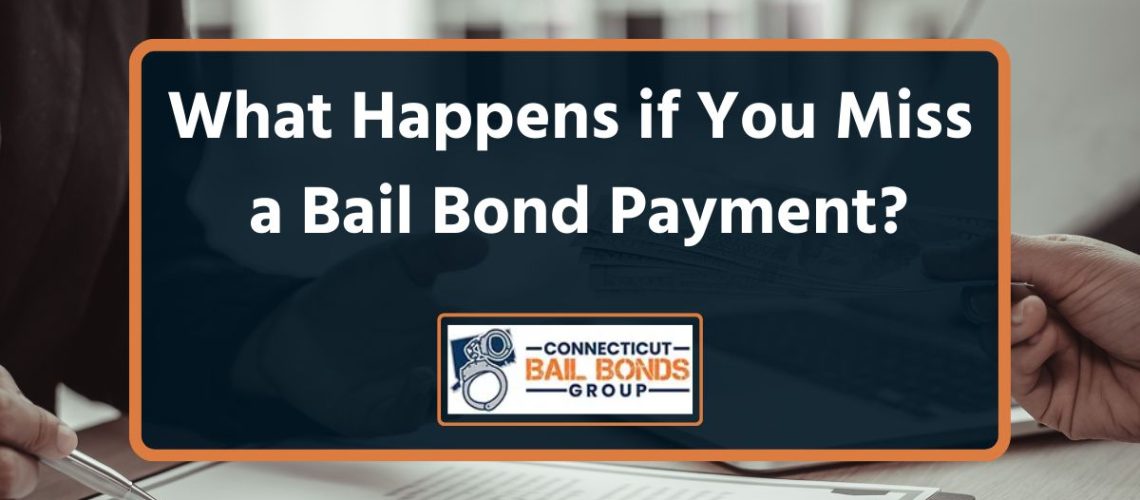Bail bonds allow defendants to pay only a percentage of the bail amount to a bail bond agency who then posts the bail on their behalf. But what if the defendant fails to pay the bail bonds company?
From revocation of bail to issuance of an arrest warrant, there are many legal consequences you may face if you miss a bail bond payment.
If you’re finding it difficult to pay your bail, you can explore the easy and affordable bail bond payment plans we offer at Connecticut Bail Bonds Group to avoid missing your bail payment. You can also schedule a quick consultation with our experts to discuss your situation and tailor a suitable solution for you.
In this article, let’s explore the importance of paying your bond, the consequences of failing to pay your bail, and how you can minimize the risks.
Why is Bail Bond Payment Important?

Bail bond payments have several implications for both the defendant and the bail bonds agent. For the defendant, it keeps them committed to not missing court dates and other set conditions despite being released from detention. For the bail bondsman, the bail bond payment is the fee for his involvement in the case.
By posting bail, defendants secure their release from jail while awaiting trial. So, the bail system also helps defendants continue their daily lives as they see out court proceedings related to their case.
Consequences of Missing a Bail Bond Payment
A bail bondsman posts bail on behalf of the defendant to secure their release from jail. They charge a premium for their services, usually about 10% of the full bail amount. If the defendant defaults in payment of the agreed-upon fee, they get a written notification reminding them of their debt. This written notification may also come with a time limit for due actions to be taken.

The defendant may incur certain severe consequences such as:
1. Forfeiture of Assets or Money
If you miss a payment, the court may declare the bond forfeited, meaning that the full bail amount becomes due immediately. This could result in the loss of the collateral you provided to secure the bond.
2. Warrant for Arrest
Failing to comply with the conditions of the bail bond agreement is considered a violation. Hence, the court may issue a warrant for the arrest of the defaulting defendant.
3. Return to Jail
Your bond agent reserves the right to abandon the responsibility of bail to you if you do not pay the fees. This implies you may go back to jail if you were released before the bail bond payment occurs or if you cannot afford the bail amount. Moreover, your bail is nullified if the bond agent relinquishes responsibility, making it more difficult to secure your release from jail.
4. Legal Penalties

In addition to the forfeiture of the bond and the issuance of a warrant, you may face legal actions such as fines or other penalties for failing to meet the financial obligations outlined in the bail bond agreement.
5. Forceful Collection of Payment
The bail bond company may employ debt collection methods such as using a bounty hunter to apprehend the defendant and recover the outstanding payments. This could also include confiscating the collateral that was used to secure the bond.
6. Damage to Credit
If the bail bond company reports the missed payments to credit agencies, it could negatively impact your credit score especially if you already have a bad credit score. This can affect your ability to secure financing in the future.
How to Mitigate the Consequences of Missing a Bail Bond
Even if you miss your payment, you can at least minimize the risks if you can act fast enough. Here are some recommended steps to take if you miss a payment.

Contact your Bail Bond Agent
It’s crucial to communicate with the bail bond company if you’re facing difficulties making the bond fee payments. Some companies may be willing to work with you to find a solution, such as adjusting the payment schedule or modifying the terms of the agreement. Be open and honest, and provide any evidence that will support your claim.
Explore Other Payment Options
Check out alternative payment options or plans that may be available. Some bail agents may allow you to make payments in installments or set up a new payment plan that better suits your current financial situation.
Seek Legal Counsel
Reach out to an attorney or bail bondsman who understands the implications of missed payments and has experience in handling similar cases. With their expert guidance, you may be able to take remedy steps to minimize the consequences.
Terms And Conditions of Bail Bond Agreements

A bail bond is a legal contract between a defendant and a bail bond agent. Bail bond agents set these terms and conditions for their business security and to mitigate risk. A typical bail bond agreement covers the following details:
- Bail Bond charge
- Responsibilities and obligations of both parties
- Collateral requirements
- Deadline for payments
- Penalties for defaults.
Note that the exact terms may vary across different bail bond agencies. Hence, you need to research to find out which one suits your budget and case.
Conclusion
Posting bail through a bail bondsman helps secure a defendant’s release faster. However, the defendant faces some severe consequences if they fail to pay bail bond fees when due.
You don’t have to wait until you miss your bail payment to seek assistance. As soon as you suspect you might not be able to meet up with the payment, do not hesitate to contact your bail bondsman to figure out a solution.
Book an appointment with us at Connecticut Bail Bonds Group let’s assess your situation and help you set up an affordable payment plan to ease the burden.


